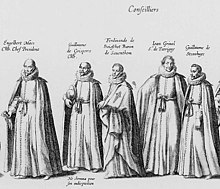Jean Grivel, lord of Perrigny (1560—1624) was a jurist from Franche-Comté (now in France), which was then part of the Spanish monarchy.

Life
editGrivel was born in Lons-le-Saunier, on 15 March 1560,[1] to Christophe Grivel and Adrienne de Pariset.[2] He studied law at the University of Dole and married Jeanne Tricornet.[3] He took part in resisting the 1595 French invasion of Franche-Comté, and his journal of the conflict was published in 1865. On 21 March 1599 he was appointed a councillor on the Parlement of Dole, and on 11 January 1608 councillor and master of requests of the Brussels Privy Council.[3] His volume of judicial decisions of the Parlement, first published in 1618, was reprinted in 1623, 1631, 1660, 1663 and 1731. He died in Brussels on 14 October 1624 and was buried in the Church of St Géry.[1] He was survived by three sons: Claude, who followed in his footsteps as a judge; Albert, who became prior of St Désiré in Lons-le-Saunier; and Ferdinand, who served as a cavalry commander in the Eighty Years War.[3]
Works
editReferences
edit- ^ a b Mémoires pour servir à l'histoire littéraire des Dix-Sept Provinces des Pays-Bas, de la Principauté de Liége, et de quelques contrées voisines, vol. 2 (Louvain, Imprimerie Académique, 1768), pp. 29-30 On Google Books
- ^ Alphonse Rousset, Dictionnaire géographique, historique et statistique des communes de la Franche-Comté et des hameaux qui en dépendent, vol. 5 (Lons-la-Saunier, 1857), p. 55.
- ^ a b c Preface to Journal de Jean Grivel, Seigneur de Perrigny, edited by Achille Chereau (Lons-le-Saunier, 1865), pp. 19-25.
- ^ Grivel, Jean (1618). "Decisiones celeberrimi sequanorum Senatus Dolani: In quibus multa, tum ad theoriam iuris, tum ad praxim & consuetudinem spectantia, dilucidè explanantur".
- ^ On Google Books